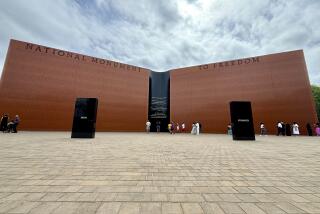Alabama Acreage Imbued With a Family’s History
- Share via
It was “down South” to us kids growing up in Ohio, as we caravaned with our families each summer to our grandparents’ Alabama farm. It was “back home” to our mothers and fathers, who had grown up on that rural spread, picking cotton, planting corn, running barefoot through its forests and fields.
To our kids, it has always been “the farm,” and though most of them had never seen it, they’d been raised on our tales of its rustic wonders--the running springs, endless fields, menagerie of pigs, chickens and cows.
What they never heard in our stories--what we scarcely thought of in the telling--were the trials and triumphs that bound our family to that land. It was my unspoken hope that this Thanksgiving reunion of the Daniel clan in Montgomery, Ala., would acquaint them not just with relatives, but with roots--with the forces that have shaped their family, and their country’s history, as well.
*
The house looked small and forlorn as we pulled into the yard from the red-clay path that led from the road. The front porch was crumbling, its wooden swings gone. The barn and henhouse were no longer standing, replaced by a stand of spindly pines. The smokehouse had been boarded over, the empty pigpen obscured by bushes and vines. At the edge of the brush stood the only thing that still looked the same--the rickety outhouse we’d been forced to use during our childhood visits, when the farm had neither electricity nor running water.
We herded our kids through its small, dank rooms, searching for some sign of its former glory, something to connect them to the tales we’d told of fireplaces and featherbeds, front porch swings, a cozy kitchen with wood-burning stove where we’d bathe at night in metal tubs.
They were clearly bewildered by the sight, confused by the notion that this bedraggled patch of land had become a totem of our family’s history.
It has been 30 years since my grandparents died and the running of the 200-acre farm fell to my widowed aunt in Montgomery, the only one of their seven children who had never moved north from Alabama. She had to rent out the house to make ends meet and sell off timber to pay property taxes.
Now, years of neglect have taken their toll. The house is empty, the creek dammed by beavers; its roads are flooded, the fields overgrown. We must finally confront the question: What to do with our family’s farm? And as I amble along its rutted dirt roads with four generations of my family, I realize the answer has less to do with land value and profit shares than with the meaning of its history.
The farm has belonged to our family for years . . . at least that sliver of our family that came here from England when this country was young. It was handed down to my grandfather, Nahman, by his mother Rose Ann, a white woman who scandalized her neighbors a century ago by having a child with the family’s black farmhand. She raised the boy with his two white siblings, and when she died, she deeded equal portions of her family’s spread to all three.
But the local folks were not about to share the bounty of their privilege with Nahman or the children he sired. So his daughter--my mother--and her sisters and brothers were forced to walk for miles to their one-room school, which only went as high as sixth grade. White children taunted them from buses en route to the local “Danielville” school . . . a building that carried our family name but never allowed black children inside.
And when his mother died 60 years ago, my grandfather had to watch from the road while her body was lowered into its grave because the family cemetery would not allow blacks inside its gates.
*
That history weighed heavy on my mind as I pushed through the wooden gate and entered the graveyard where my Daniel ancestors lie. It is progress, I suppose, that by the time my grandparents died 25 years later, attitudes had softened enough to allow their burial here.
As we study the headstones on our family’s ancient graves, my children are surprised to discover the markers of Confederate soldiers. How, I wonder, can they fit this visit into their simple notions of family and history?
They are children of privilege, living in suburban homes, going to school with children of various cultures and hues, untainted by the sting of racism that so constricted their grandparents’ lives. All they know of discrimination comes from stories they’ve heard, books they’ve read, movies they have seen on TV. This, now, is “Remember the Titans” made real.
Is it too real? Can they understand the pride their great-grandfather felt when he earned enough from his patch of land to send six children north to school? Can they realize that our parents’ lives were built on lessons learned toiling in cotton fields? Will they ever feel the sense of responsibility our history lends to my generation’s endeavors, motivating us to achieve, in order to honor our elders’ efforts?
They will. They may never visit the farm again, but they will hear its stories over and over and over, until they understand how our family’s trials and triumphs are bound up in this land, this emblem of all we’ve been and can become. We may not have trust funds to bequeath our children, but they will inherit something just as rich--our land, and with it, our legacy.
*
Sandy Banks’ column runs on Sundays and Tuesdays. Her e-mail address is sandy.banks@latimes.com.
More to Read
Sign up for The Wild
We’ll help you find the best places to hike, bike and run, as well as the perfect silent spots for meditation and yoga.
You may occasionally receive promotional content from the Los Angeles Times.






